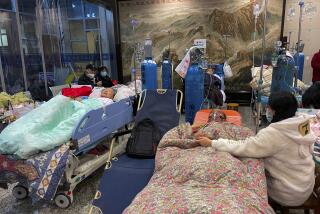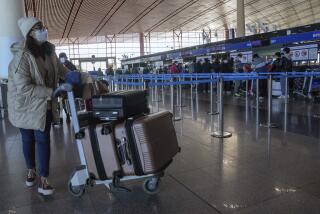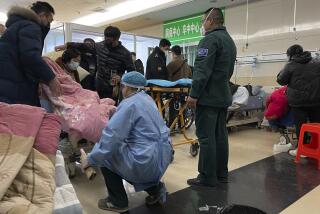They were already in China’s prisons. Now the coronavirus is there, too
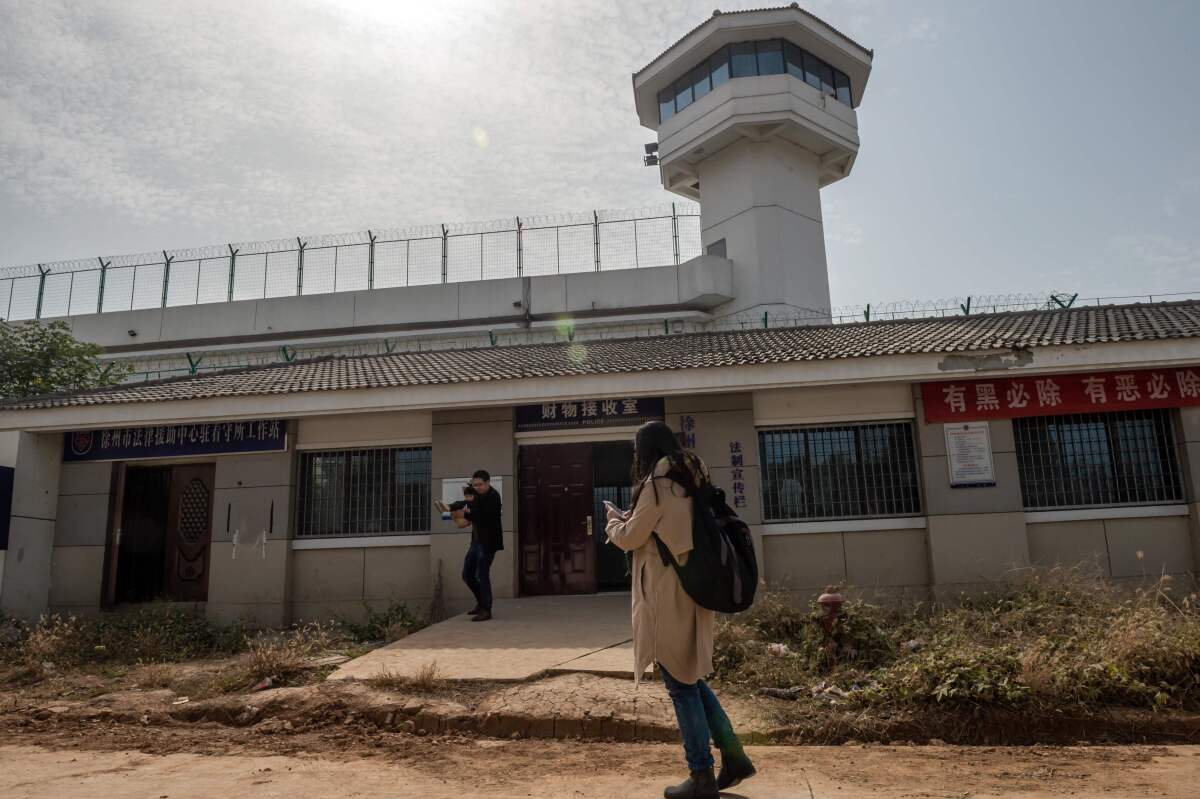
- Share via
BEIJING — It was bad enough that Deng Xiaoyun’s husband, human rights lawyer Qin Yongpei, had been jailed as a subversive. But when the coronavirus started breaking out in prisons, she had no idea if he was sick or dead.
A stocky, balding man with a thick southern Chinese accent, Qin had been a nemesis to local officials in the Guangxi region, often criticizing their corruption and advocating for people seeking their rights. The Times met Qin last year when he was helping villagers arrested for protesting pollution from state-owned mining companies.
Deng hasn’t been allowed to see her husband. She tried to transfer funds for living expenses to him. But the bank texted her last week that no one had accepted her transfer for more than seven days. Then Deng read a news alert: There was an outbreak in China’s jails of COVID-19, the coronavirus disease that has infected more than 83,000 people and killed more than 2,800 worldwide.
“My whole body went numb,” Deng said in a phone interview. The virus cases were in the provinces of Hubei, Shandong and Zhejiang, not Guangxi. But she knew nothing about her husband’s condition. “I just feared, what if something happened inside?”
Chinese authorities have announced 555 cases of COVID-19 infections across five prisons in three provinces. Prison officials have been fired for allowing the outbreak to spread, and authorities say no other inmates elsewhere in the nation have been infected. As they have done in cities and villages, officials have been downplaying the threat of a mysterious illness that has called into question China’s ability to contain what has become a global crisis.
The lack of information about detainees’ conditions is fanning fear among families of the incarcerated, whose ranks include human rights lawyers, social workers, activists, pastors and more than 1 million Muslim minority Uighurs in the western region of Xinjiang.
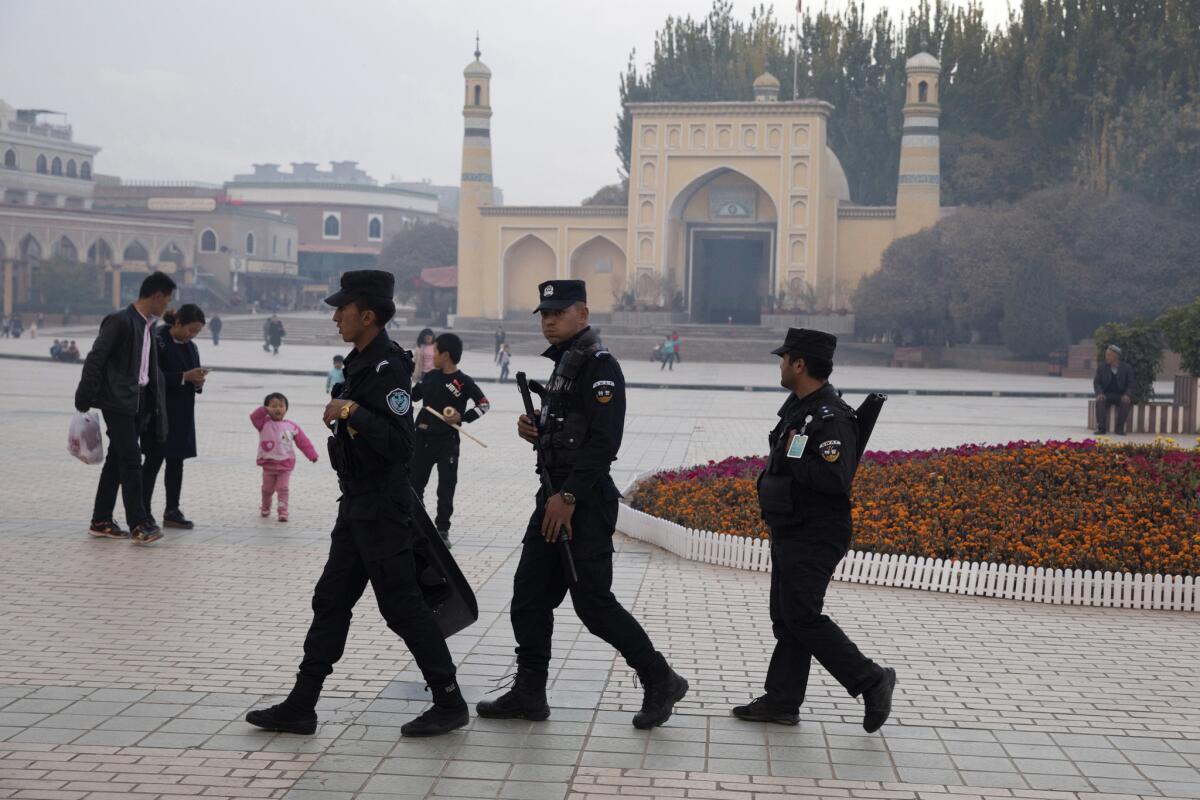
Prisons are an ideal environment for viral transmission, according to medical experts. Doctors recommend keeping a distance of at least 6 feet from any sick person to avoid contagion from respiratory droplets when they cough or sneeze. Confirmed cases should remain in complete isolation, with the door closed.
“You aren’t going to see bottles of Purell. You’re going to see people existing very close together, which aids transmission,” said Brandon Brown, an epidemiologist at UC Riverside.
Perhaps the closest comparison to the prison scenario would be cruise ships, he said, where large populations living in close quarters have illustrated the virus’ explosive spread. Scientists have another concern: feces. In addition to the virus surviving for hours on surfaces — handrails, elevator buttons and even exchanged business cards — researchers suspect major contagion occurs in shared bathroom settings.
Fecal contamination is an “occasionally dramatic accelerator in coronavirus outbreaks,” said Dr. Michael Callahan, an infectious disease physician at Massachusetts General Hospital.
That’s almost inevitable in prison settings, where dozens of inmates share open toilets or buckets for defecation. Former detainees in China also describe overcrowding, unclean food and poor ventilation in prisons and holding centers.
A member of Chengdu’s Early Rain church, an underground Christian congregation that authorities broke up in 2018, described a detention facility where he was held for two weeks in March 2019: About 30 people were crammed into a cell with a 15-inch walkway flanked by two platforms.
They slept shoulder-to-shoulder, 10 to 12 people on each platform, with the rest on the floor.
“You force yourself down there and make it through the night,” he said, asking to remain anonymous for protection. “It’s impossible to quarantine there, it’s so crowded.”
Wang Yi, the church’s pastor and a former human rights lawyer, was sentenced to nine years in prison for “subversion of state power” and “illegal business operations” in December. Authorities have not disclosed where he is imprisoned.
Other detainees include labor activists such as Wei Zhili, 30, who had advocated for construction workers dying of occupational lung disease in Shenzhen. He was arrested in March 2019 on charges of “picking quarrels and provoking trouble,” and has not had a trial.
His wife, Zheng Churan, a feminist who was jailed for a month in 2015 for handing out stickers against sexual harassment on the subway, wrote on Twitter that she “went crazy” after hearing about the prison infections.
“Xiaowei is in the detention center, our lawyer can’t see him, I don’t know anything about his health at all,” said Zheng, using a nickname for her husband. “Some say prisons and detention centers are the safest place … it’s not like that at all. The more closed a place is, the easier it is to cover things up.”
Meanwhile, authorities have reported 76 infections and two deaths in Xinjiang, where at least 1 million Uighurs and other Muslim minorities have reportedly been detained in concentration camps for forced “reeducation.” Their families are desperate for information about their status.
A petition circulating on Change.org has gained more than 17,000 signatures, calling for the camps to close in light of the virus outbreak. Hashtags have gained popularity on Twitter, including #VirusThreatInTheCamps and #WHO2Urumqi, referring to the capital of Xinjiang.
Chinese authorities have called reports of the virus’ threat to detainees “nothing but fabrications and slander,” claiming that reeducation has ended and that all detainees have been released back to their homes. But many Uighurs abroad say that, while some Xinjiang relatives have been released, others have been moved from camps to prisons.
For Zulhayat Yaermaimaiti, 31, a Uighur from Ili, a northwestern part of Xinjiang bordering Kazakhstan, the virus has worsened fears for her brother, Wutikuer, 29, who was taken for “reeducation” in April 2017, shortly after he graduated from college in Turkey and returned to Xinjiang.
Her brother had hoped to open a wholesale import-export business back home, Yaermaimaiti said in a phone interview from Tennessee, where she now lives. But he became a target for the camps probably because he’d traveled abroad, one of the Chinese government’s criteria for measuring “extremism.”
A year after Wutikuer’s detention, their father, who’d worked as a driver for the local education bureau for 30 years, was also taken for “reeducation.” Their mother, an elementary school teacher, was spared only because she was in a hospital intensive care unit, suffering heart problems triggered by stress, when police came in, took pictures and decided not to detain her. Yaermaimaiti asked that her parents’ names be withheld because she fears for their safety.
Her father was released last February, Yaermaimaiti said. He had lost hearing in one ear, suffered severe weight loss and developed skin rashes that he said were common in the camp.
“He became so thin — when I saw him, I couldn’t help it, I cried every day,” she said.
But her brother remains detained in what her family believes is a prison. Late last year, security officials facilitated a video call with detainees through a screen at a public security office. Mother and son spoke for about five minutes.
After seeing her son for the first time, the mother fell sick for three days, shocked at how gaunt he looked — and that he was wearing prison clothes. “She said, ‘This is prison, not a school,’” Yaermaimaiti said.
Yaermaimaiti’s parents are now barred from leaving their house as part of a quarantine against the coronavirus. They run a small market and live off the supplies they have there. But they fear for other families and for their son, who has never had a trial and whose length of sentence is unknown.
“We are especially worried about coronavirus — what if it’s in the camps or prisons? They won’t be able to manage it at all. Their bodies will not be able to survive this virus,” Yaermaimaiti said.
“It’s not just my family. It’s many families that already had bad conditions these years because their husbands were taken, their sons are not there, they’ve lost their source of income — a lot of parents are gone,” she said. “We are also humans. We just want to live normally, nothing else…. I can’t imagine what happens next.”
Experts from a World Health Organization team that visited China this month have praised the country’s epidemic response for its efficiency and scale. “If I had COVID-19, I’d want to be treated in China,” said WHO public health expert Bruce Aylward at a news briefing in Geneva on Tuesday.
Others are not so effusive.
“It’s disturbing to hear international public health experts make broad remarks praising the Chinese government’s ability to quarantine extraordinary numbers of people. I hear that, and I think, ‘That’s precisely the extraordinary degree of control that they use to arbitrarily detain 1 million people,’” said Sophie Richardson, the China director at Human Rights Watch.
“Let’s be a little bit more nuanced and thoughtful about human rights violations before lavishing on the praise,” she said.
Chinese authorities have arrested activists in recent weeks on the pretext of doing “coronavirus prevention checks,” including prominent civil rights activist Xu Zhiyong, who was detained from a friend’s home in Guangzhou last week. On Tuesday, Gui Minhai, a Hong Kong bookseller with Swedish citizenship, was sentenced to 10 years in prison for “illegally providing information overseas.”
He is one of several booksellers who were abducted and detained in 2015 after they published books featuring gossip about Communist Party leaders.
Deng, the lawyer’s wife, said that friends and activists who tried to contact her about Qin were interrogated by police and ordered to stop talking about her husband. She made a trip to Beijing last year, hoping to petition central authorities for help — only to find that she was on a blacklist of human rights lawyers’ relatives.
Desperate for information about her husband, Deng tried to visit the Nanning detention center this week. But the building was shut, as are most buildings aside from supermarkets and pharmacies, she said. She cannot work in her usual job as a salesperson in a mall, and police sit at building entrances demanding special entry permits to enter or exit.
Authorities are telling everyone to stay at home. Deng sits in silence, watching the virus numbers change day by day.
“Now it’s like we’re all in prison,” she said.
Su reported from Beijing and Baumgaertner from Los Angeles.
More to Read
Sign up for Essential California
The most important California stories and recommendations in your inbox every morning.
You may occasionally receive promotional content from the Los Angeles Times.
